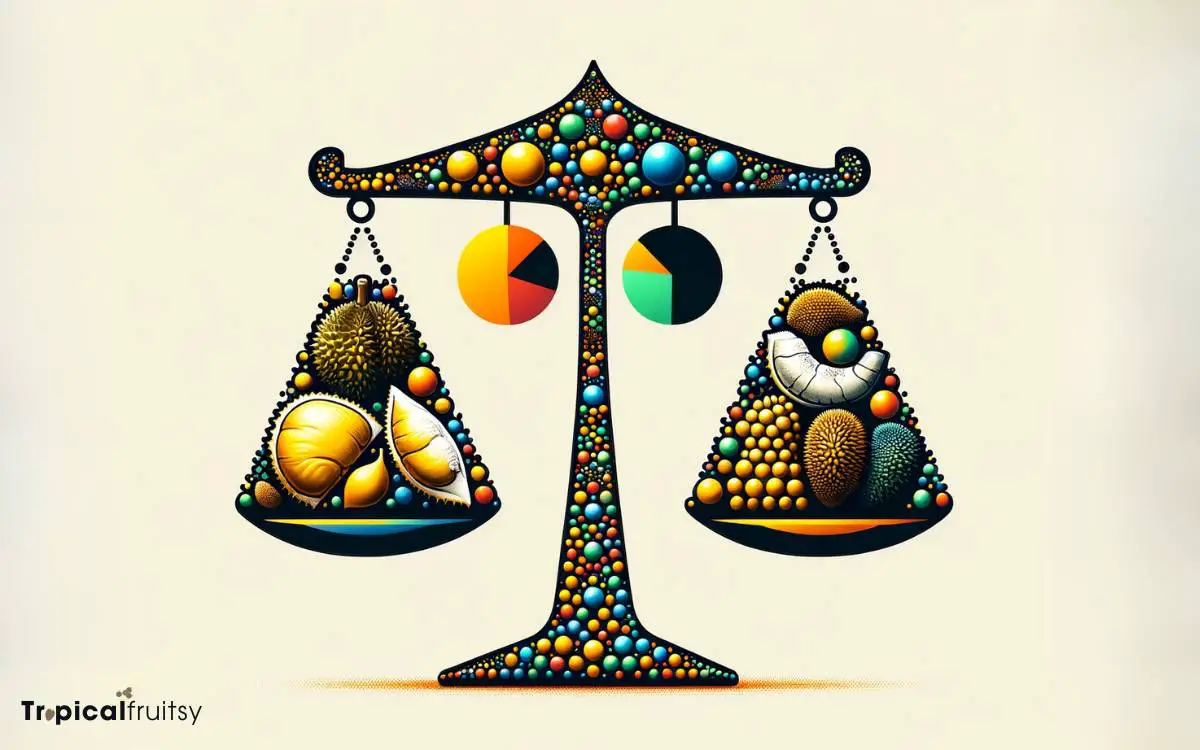Is Durian Good for Weight Loss? Transform Your Body!
Durian can be consumed in moderation as part of a weight loss diet due to its fiber content, which may aid in satiety.
However, its high calorie and carbohydrate levels should be considered in the context of an individual’s overall dietary intake.
Durian’s role in weight loss is complex:
A small serving of durian can be included in a balanced diet, but it should not be a primary fruit choice for those looking to lose weight due to its high caloric density.
Durian’s indulgent creaminess and fiber can be enjoyed, but mindful portions are essential for weight management.

Key Takeaway
Nutritional Content of Durian for Weight Loss Diets
| Nutrient | Amount per 100g of Durian |
|---|---|
| Calories | 147 kcal |
| Carbohydrates | 27.09g |
| Fiber | 3.8g |
| Sugar | 6.75g |
| Fat | 5.33g |
| Protein | 1.47g |
Unveiling Durian’s Nutritional Profile

Analyzing durian’s nutritional profile is essential to understand its potential impact on weight management strategies.
Known as the ‘King of Fruits’, durian is rich in dietary fiber, which can enhance satiety and help regulate bowel movements.
It provides a significant amount of energy due to its high carbohydrate content, which should be considered in the context of an individual’s total caloric intake.
Durian also contains healthy fats, which are crucial for maintaining cell integrity and aiding in the absorption of fat-soluble vitamins.
Moreover, it is a source of vitamins B, C, and E, and minerals such as potassium and magnesium, supporting overall metabolic health.
While durian’s nutrient density is beneficial, moderation is key due to its caloric value to prevent potential weight gain.
Caloric Impact on Dieting

The caloric content of durian plays a pivotal role in its effectiveness as part of a weight loss diet. A single cup of durian provides roughly 350 calories, primarily from its carbohydrate content, which includes natural sugars and dietary fiber.
While this tropical fruit is nutrient-dense, offering a rich supply of vitamins and minerals, its high caloric density can be problematic for those monitoring their caloric intake for weight loss. To incorporate durian into a weight management plan, portion control is essential.
Consuming it in moderation, as part of a balanced diet rich in whole foods, can help prevent excess caloric intake while still providing the body with essential micronutrients.
Mindful consumption of durian, therefore, can support a holistic approach to weight loss.
Durian’s Influence on Satiety

Moving on to the aspect of satiety, durian’s high fiber content can significantly contribute to a feeling of fullness, which may aid in reducing overall calorie consumption.
Fiber is known for its ability to slow digestion and prolong the sensation of fullness, thereby potentially curtailing the frequency and volume of food intake.
This aspect of durian is particularly relevant when considering weight management strategies, as a satiating diet can help prevent overeating.
Moreover, the natural sweetness of durian might satisfy sugar cravings, which, in turn, could minimize the inclination toward high-calorie, sugary snacks.
It’s important to note, however, that moderation is key, given the relatively high calorie content of durian compared to other fruits.
Thus, including durian as part of a balanced diet could be beneficial for weight control when consumed mindfully.
Metabolic Effects of Durian Consumption

While durian’s high fiber content aids in satiety, its impact on metabolism also plays a crucial role in weight management.
The fruit’s natural composition may influence metabolic processes in a few noteworthy ways:
- Thiamine Contribution: Durian is rich in thiamine, a vitamin that assists in carbohydrate metabolism, potentially aiding in more efficient energy use.
- Antioxidant Presence: The antioxidants in durian, such as Vitamin C, combat oxidative stress, which is linked to improved metabolic function.
- Dietary Fats: Durian contains healthy monounsaturated and polyunsaturated fats that can influence metabolism, possibly favoring fat oxidation over storage.
These components collectively suggest a complex interaction with the body’s metabolism, which might support weight management when durian is consumed as part of a balanced diet.
Durian in Balanced Weight Loss Plans

Incorporating durian into a balanced weight loss plan can be beneficial due to its nutrient-dense profile and satiating properties.
This tropical fruit is rich in dietary fiber, which can help promote feelings of fullness and reduce overall calorie intake.
Moreover, durian contains a variety of essential nutrients that support overall health, which is critical when reducing caloric consumption to lose weight.
Here is a nutritional snapshot of durian:
| Nutrient | Amount per Serving | % Daily Value* |
|---|---|---|
| Dietary Fiber | 3.8g | 15% |
| Vitamin C | 23.9mg | 40% |
| Potassium | 436mg | 12% |
A holistic approach to weight loss emphasizes the importance of nutrient density, not just calorie counting.
Durian, when consumed in moderation, can be a valuable addition to a diverse and balanced diet aimed at healthy weight management.
Conclusion
While the ‘king of fruits’ boasts a rich nutritional tapestry, its caloric density and impact on satiety require mindful incorporation into diets.
The metabolic implications of durian consumption warrant further exploration but suggest potential benefits.
As with the famed ambrosia of the gods, moderation and balance are key. Integrating durian into a weight loss regimen should be approached with dietary wisdom, ensuring it complements a holistic strategy towards achieving a healthier physique.






